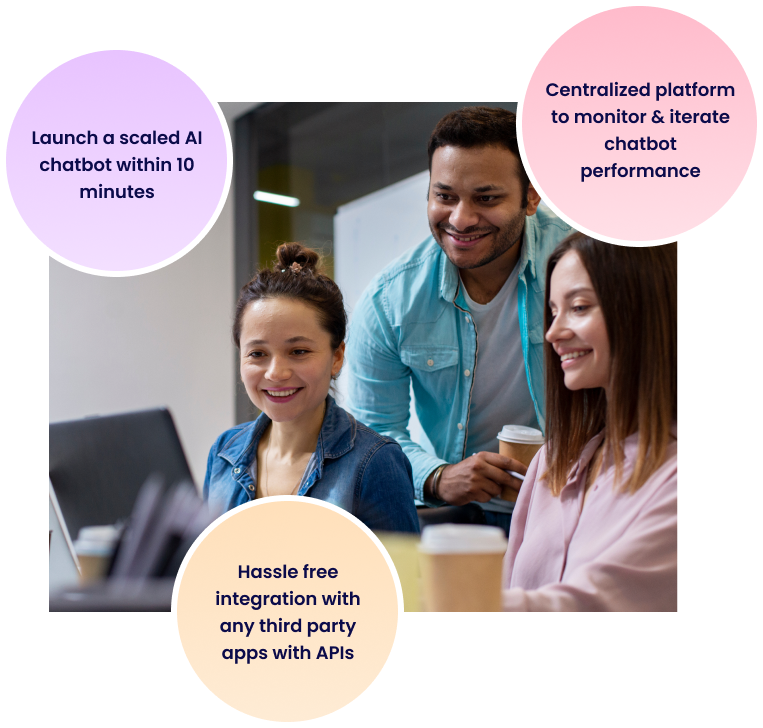Introduction
As technology continues to evolve at an unprecedented pace, educational institutions face increasing pressure to adapt to the changing needs of both students and staff. One of the most significant technological advancements reshaping education is the use of AI chatbots. These intelligent tools are becoming integral to how institutions manage daily operations, enhance learning experiences, and engage students.
AI chatbots for education not only provide 24/7 support but also help streamline administrative tasks, offer personalized learning, and improve communication across the board. In this blog, we’ll explore 10 ways AI chatbots are empowering educational institutions and why they are poised to become an essential part of the modern educational experience.
Explore How Educational Chatbots Could Be the Future of Education.
Ways AI Chatbots for Education Can Empower Educational Institutions
Round-the-Clock Student Support
One of the most immediate benefits of implementing AI chatbots in educational institutions is their ability to offer 24/7 student support. Unlike human staff, who are limited by working hours, AI chatbots for education are always available. Whether it’s a student struggling with a homework question late at night or a prospective applicant asking about admission deadlines, the chatbot provides instant answers.
This kind of always-on support can drastically reduce the frustration students often face when they can’t get timely help. In addition, it reduces the workload on support staff, enabling them to focus on more complex or high-priority tasks.
Personalized Learning Assistants
AI chatbots for education can be configured as personalized learning assistants for students. They analyze each student’s learning habits, performance metrics, and preferences to offer customized study plans and materials. This form of adaptive learning ensures that each student receives the support they need to succeed, regardless of their learning pace or style.
For instance, a student struggling with algebra might get extra practice questions tailored to their weaknesses, along with timely reminders to complete assignments. Chatbots can even integrate with online learning platforms to track student progress and offer real-time feedback.
Simplifying the Admissions Process
Admissions can be a daunting process for students and institutions alike. AI chatbots for education help by providing clear, real-time guidance to prospective students about application requirements, deadlines, and available scholarships. They can even automate part of the application process, such as form submissions and status updates, thus streamlining admissions.
This not only makes the experience smoother for applicants but also reduces the administrative burden on admissions officers. AI chatbots allow institutions to handle more applications with less manual effort, leading to faster processing times and higher satisfaction rates.
Real-Time Campus Updates
Educational institutions are bustling environments with numerous activities happening simultaneously—lectures, club meetings, library hours, extracurricular activities, and more. Keeping students informed about everything can be a challenge. AI chatbots can provide real-time updates on campus events, academic schedules, room availability, or even cafeteria menus.
With a chatbot, students can ask, “When is the next exam?” or “What are the library hours today?” and receive instant responses. This kind of real-time communication fosters better student engagement and helps them manage their time effectively.
Virtual Academic Advisors
Guiding students on course selection, career paths, and subject combinations is another area where AI chatbots can make a significant impact. Acting as virtual academic advisors, chatbots can help students navigate complex academic systems. For instance, they can recommend courses based on a student’s academic history, future goals, and even market trends.
This reduces the load on human academic counselors while providing students with data-driven advice on demand. In large institutions, where academic advising services may be stretched thin, AI chatbots ensure that every student gets timely and personalized advice.
Streamlining Administrative Tasks
Administrative tasks like logging attendance, handling enrollment, or managing student records are time-consuming but crucial for educational institutions. AI chatbots can automate many of these routine activities, thereby streamlining administrative processes. For example, chatbots can handle attendance by automatically logging students’ check-ins for classes or exams.
In addition, they can answer frequent administrative queries, such as “How can I change my major?” or “When is the deadline to drop a course?” By taking on these routine tasks, chatbots free up human administrators to focus on more strategic responsibilities.
Enhancing Communication Between Students and Faculty
Effective communication between students and faculty is key to creating a productive learning environment. AI chatbots improve this communication by acting as intermediaries, ensuring that both parties stay informed and connected. For instance, chatbots can send automated reminders about assignments or upcoming exams, reducing the likelihood of missed deadlines.
Moreover, chatbots can provide instant answers to common questions, such as “When will the grading for my exam be completed?” or “How do I schedule office hours with my professor?” This enhances student-faculty interaction, reducing unnecessary delays and improving the overall learning experience.
Collecting Student Feedback
AI chatbots offer an efficient way to gather real-time feedback from students about their learning experiences, courses, or instructors. Institutions can use this feedback to make immediate adjustments, ensuring that they are continuously improving the quality of education they provide. Instead of sending out traditional surveys, a chatbot can ask a student, “How was your experience with today’s lecture?” or “Would you recommend this course to others?”
This kind of automated feedback collection can significantly improve response rates and provide educational institutions with actionable insights.
Mental Health Support
With rising concerns about student mental health, AI chatbots can serve as a first point of contact for students seeking emotional support. These mental health chatbots are programmed to recognize signs of stress, anxiety, or depression. While they are not substitutes for professional counselors, they can offer coping strategies, direct students to useful resources, or even schedule appointments with mental health professionals.
AI chatbots provide a private, non-judgmental space for students to express their concerns, ensuring they receive help before their issues escalate. This contributes to better mental health management on campus.
Boosting Student Engagement
One of the most significant advantages of AI chatbots is their ability to boost student engagement. By integrating with platforms like social media or learning management systems, chatbots can send reminders, quizzes, or even fun facts related to students’ courses. These activities not only keep students engaged but also help them retain information better.
Furthermore, chatbots can foster a more interactive learning environment by conducting quick polls or surveys, sparking discussions, or offering real-time quizzes during lessons.
Conclusion
AI chatbots are transforming educational institutions by enhancing both operational efficiency and the student experience. They provide 24/7 support, automate routine tasks, personalize learning, and foster stronger communication between students and staff. As educational institutions strive to adapt to the needs of modern learners, AI chatbots will play an increasingly critical role in shaping the future of education.
Whether it’s improving student engagement, offering mental health support, or streamlining administrative processes, AI chatbots for education are set to revolutionize how institutions operate. For institutions looking to stay ahead, investing in AI chatbot technology is not just a smart move—it’s essential for success in the digital age.
Ready To Explore?
Frequently Asked Questions?
What are AI chatbots for marketing?
AI chatbots for marketing are intelligent tools designed to automate customer interactions, provide personalized recommendations, and assist in marketing efforts by simulating human-like conversations. They are used to engage potential customers, answer inquiries, and support various stages of the marketing funnel.
How can AI chatbots improve my marketing strategy?
AI chatbots for marketing enhance strategies by automating customer engagement, offering 24/7 support, and providing personalized recommendations. They help capture leads, increase engagement, and offer instant responses, which can drive higher conversion rates.
How do AI chatbots assist in lead generation for marketing?
AI chatbots for marketing engage visitors by asking qualifying questions, collecting contact information, and guiding them through the customer journey. By interacting with potential customers in real time chatbots capture high-quality leads and feed them into the sales process.







